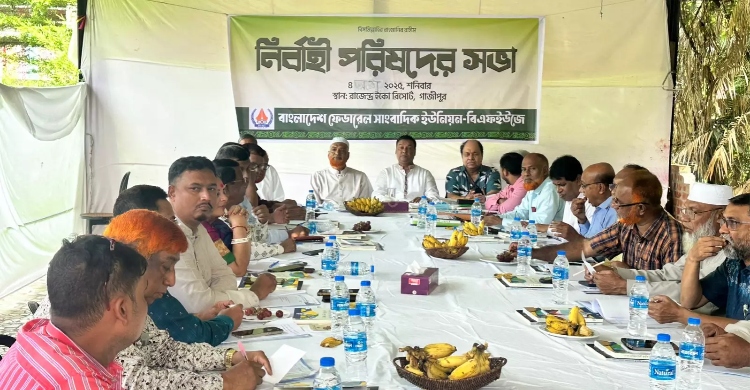BFUJ demands implementation of 9th wage board, formation of 10th, and other reforms


The Bangladesh Federal Union of Journalists (BFUJ) has demanded immediate implementation of the 9th Wage Board and the formation of the 10th, along with eight other pressing demands aimed at improving the professional rights, welfare, and security of journalists across the country.
The demands were raised at the BFUJ’s executive committee meeting held in Gazipur on Saturday morning.
Chaired by Acting President Obaidur Rahman Shaheen and moderated by Secretary General Quader Gani Chowdhury, the meeting was attended by Vice Presidents Muhammad Khairul Bashar and AKM Mohsin, Assistant Secretary General Bashir Jamal, Treasurer Shahidul Islam, and Organizing Secretary Erfanul Haque Nahid, among others.
Among the other demands were the formulation of a national policy to protect journalists, a two-day weekly holiday for media professionals, justice in the long-pending murder cases of journalist couple Sagar-Runi and other slain journalists, and the repeal of repressive laws that hinder press freedom.
The BFUJ also called for eliminating corruption in the Department of Films and Publications (DFP), ensuring transparency in the allocation of government advertisements and supplements, and establishing a uniform wage structure for all media platforms including print, online, television, radio, and multimedia.
Journalist leaders expressed concern that despite repeated promises, the wage board is yet to be implemented in practice. With the cost of living rising due to inflation, they said, it is vital that the current government act swiftly to implement the 9th Wage Board and initiate the process of forming the 10th.
They criticized the current disparity where most media houses fail to provide timely salaries, often avoid issuing appointment letters, and do not regularize jobs after the mandatory six-month period.
Speakers also highlighted that journalists are being silenced through legal intimidation, comparing the existing 32 restrictive laws to “landmines” that discourage investigative reporting and force many into self-censorship.
The federation mentioned the dire condition of journalists outside Dhaka, where many are paid as little as Tk 2,000 to Tk 5,000 per month. In some instances, TV channels also demand money from their district representatives, pushing them toward corruption.
BFUJ emphasized the urgent need for a clear policy to address these issues and protect media workers.
The meeting also underscored the need for accident insurance, medical and life insurance, provident funds, gratuity, and legal assistance for journalists.
It urged for a safe and inclusive work environment, including the provision of separate restrooms for female journalists.
